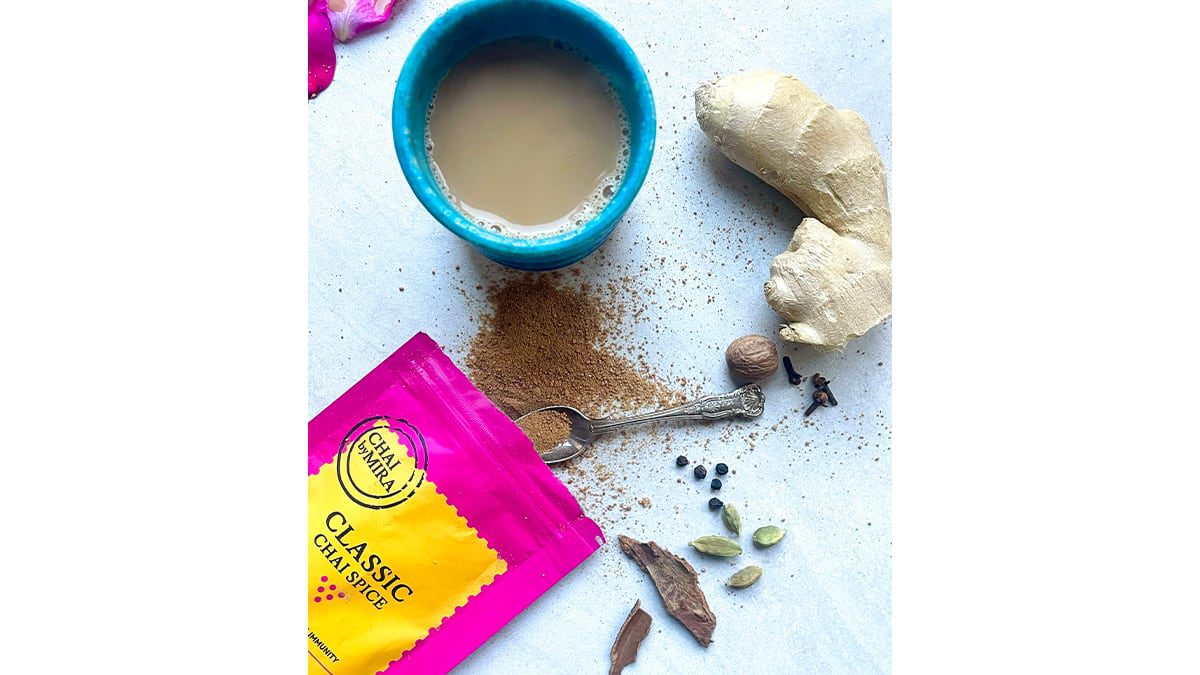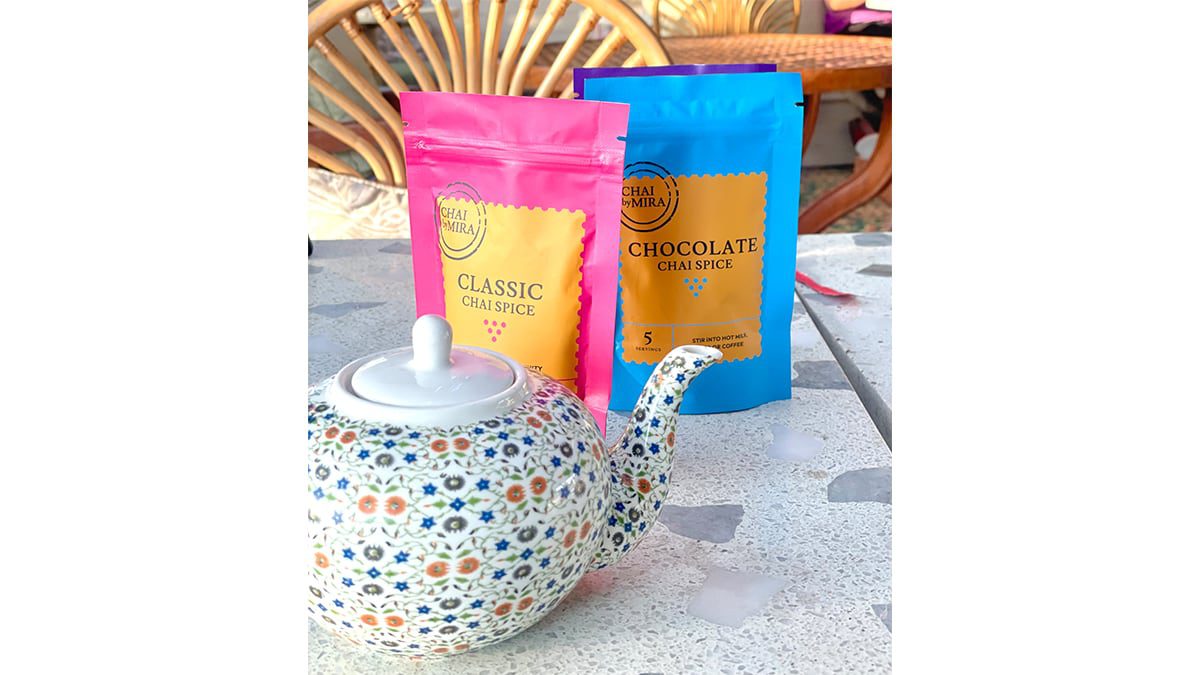Fuelled by Form: Mira Manek on Ayurveda for a Better, More Balanced Life

Mira Manek (@miramanek) has always felt a deep connection to her Indian food heritage. Growing up in London in a close-knit family, she was raised on wholesome Gujarati curries and nourishing bowls of daal.
After travelling extensively through India, she felt inspired to share everything she’d learned about food, spiritual practices and spices with frazzled Western audiences looking for grounding and meaning.
She’s since published three books, including the bestselling cookbook ‘Saffron Soul’, a guide to Ayurveda and happiness called ‘Prajna’, and ‘The Book of Chai’, a celebration of the ancient spiced tea and its many wellbeing benefits. In 2018 she launched her own chai brand, Chai by Mira, alongside a successful pop-up café in London’s Carnaby Street.
We recently caught a quick tea break with Mira to hear more about how her upbringing shaped her career, her approach to wellness and her passion for making ancient wisdom relevant to modern life.
How did your upbringing inspire your approach to cooking?
I grew up eating Gujarati vegetarian food which is really healthy and naturally quite Ayurvedic – but it wasn’t until much later that I truly appreciated how nourishing it is.
In my teens and twenties, I got caught up in this idea of what ‘healthy’ was supposed to look like – low-fat, eating little but often, all those trends… Back then, I honestly thought being healthy just meant being thin.
I started cutting out things like oil, and I distanced myself from the kinds of food I’d grown up with, like curries and rich home-cooked meals. I still ate Indian food, but it was always with a mindset of ‘I shouldn’t be eating too much of this.’
It wasn’t until my late twenties that something shifted. I realised that the food I grew up eating was actually incredibly nutritious and wholesome. It was full of flavour, balanced and rooted in this deep wisdom around digestion and the gut. That’s when I really felt called to reconnect with it.
There are so many powerful Ayurvedic rituals – what are some of your favourite ones to practise?
One thing I always come back to is the principles of eating – that it’s not just what you eat, but how and when you eat that really affects your gut and overall digestion. Things like leaving enough time between meals, not eating too late at night, eating with awareness; all of these are Ayurvedic principles that really support the body.
One of my absolute favourite beauty rituals is oiling the body, which is what’s known as ‘abhyanga’ (or self-massage) in Ayurveda. I might not do it every single day, but I try to regularly massage my joints or the soles of my feet at night, as I find it so soothing.
At night I often take a small amount of castor oil in warm water for digestion too, alongside eating black seed oil and black sesame seeds.
Grounding rituals are also important to me, like journaling, walking barefoot on the earth, or just taking a quiet walk in nature when I can. Even if it’s once a week, it makes a huge difference to how I feel.

You’ve written a book about chai, what are some of the biggest health benefits of this ancient drink?
What’s so beautiful about chai from an Ayurvedic perspective is that it’s made with spices that really support digestion. Each spice used in chai is there for a reason – it helps stoke your ‘agni’, or digestive fire, which is a core concept in Ayurveda.
If you have a well-functioning ‘agni’, it means better digestion, better nutrient absorption and overall balance in the body.
For example, ginger in chai is so good for digestion and is also a well-known anti-inflammatory. Then you’ve got black pepper, which you might not immediately associate with tea, but it helps the body absorb other nutrients more effectively.
Turmeric, which everyone knows as the golden super spice, is also highly anti-inflammatory and antioxidant-rich. Plus there’s cinnamon for balancing blood sugar levels, cardamom that freshens the breath and calming nutmeg, which is known for lifting the mood and supporting serotonin levels.
If you use these spices in small, consistent ways, they can really support your wellbeing. Even just adding a pinch of a spice blend into your tea, coffee or warm milk can give you some of those lovely benefits.
Do you have any self-care rituals that are non-negotiable for you?
One of the things I’ve really prioritised recently is time in the sauna. Ideally, I’ll go two or three times a week. It’s something I absolutely love and find really grounding. There are so many benefits, both physically and mentally, and for me it’s like a reset button.
Journaling is another one. It’s not always structured or something I do every single day, but I try and do it at least once or a few times a week. And I think with journaling, it’s less about ticking a box and more about feeling inspired to write – like, really tuning into how I’m feeling and reflecting on that.
Sometimes it’s free-writing, sometimes I’ll use prompts. It’s really just about getting things out of my head and onto the page. It can be so clearing, especially if you’re feeling stuck or emotionally overwhelmed.
Prayer and mantra are really important too. It’s quite personal, and everyone’s spiritual practice looks different, of course, but whether it’s a quiet moment with my mala beads, a prayer before bed, or even just sitting in stillness, I find it deeply nourishing. Basically anything that builds that feeling of spiritual connectedness, or coming home to yourself.
What are your top three favourite spices?
Definitely cinnamon. I love its warm, sweet spice. Then ginger and turmeric for their healing power. I also have a soft spot for saffron, especially since my first book was called ‘Saffron Soul’.

What’s been the highlight of your career so far?
Oh, that’s a tough one! I’ve always dreamed of writing books, so having three published feels like a big achievement. But more recently, growing my chai business, Chai by Mira, into 250 cafes across the UK and abroad – that’s been huge.
It’s something I never imagined I could do, but it’s taught me that with hard work, you really can make things happen.


















